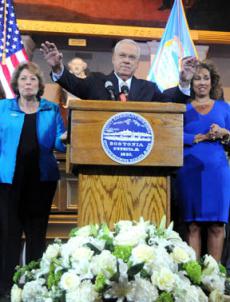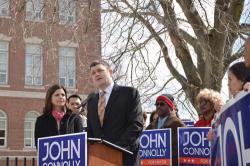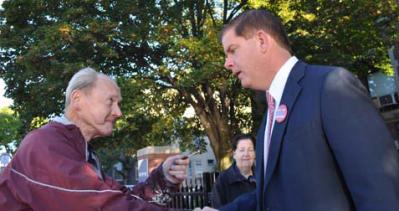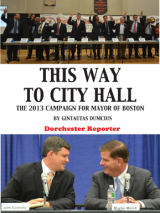January 2, 2014
 Mayor Tom Menino announced he would not seek another term on March 28, 2013.
Mayor Tom Menino announced he would not seek another term on March 28, 2013.
The night of March 27, 2013 had the state’s political class initially focused on a U.S. Senate debate between Congressmen Stephen Lynch and Ed Markey, who were both vying for the Democratic nomination. But nearly everybody, from inside the debate’s green room to politicians’ fundraisers and their homes, ended up with their faces glued to their phones as word leaked out that the mayor of Boston would not be running for another term. In this edited excerpt of his campaign trail ebook “This Way to City Hall,” Dumcius takes us through what happened on that day.
On a cloudy Wednesday afternoon in late March, the black SUV sat in its usual spot, inside the horseshoe-shaped driveway off of Congress Street and underneath City Hall’s concrete overhang.
Sometime before sunset, Mayor Thomas M. Menino slipped out of the building and into the car, and with his detailed police officer in the driver’s seat, set off for the Hyde Park neighborhood of Readville and his Chesterfield Street home, the concrete structure disappearing behind him.
Soon after, in the mayor’s press office, the phones started to ring. David Bernstein, a longtime political reporter whose newspaper, the Boston Phoenix, had folded weeks ago, had taken to Twitter, the social networking site, with rumors of the coming shift in the city’s political axis. “Past 24 hours I’ve been hearing that Menino is informing key people he is NOT running for re-elect,” he wrote. “UNABLE TO CONFIRM but nobody will deny.”
The whispers were true: Menino, the 70-year-old Hyde Park native who had become the city’s first Italian-American mayor 20 years earlier, had made the decision in the last few days, mulling it with family and friends after agonizing for weeks. There would not be a sixth campaign for the top job in City Hall.
There was still work to be done that night, however. The speech, which would be delivered at Faneuil Hall, needed to be finished, and the mayor had several more phone calls to make. In his living room, he was joined by his wife, Angela, and his top aides and friends, including Michael Kineavy, his No. 2; Dorothy “Dot” Joyce, his chief spokesperson; Mitchell Weiss, his chief-of-staff; Dorchester union chief Michael Monahan; longtime confidant Harry Collings; former chief of policy Peter Welsh and Howard Leibowitz, who had been with him since the early days in 1993, when Menino had been “acting mayor” before beating Dorchester state Rep. Jim Brett to claim the mayoralty.
Menino and his aides discussed which accomplishments to highlight in the speech: the supermarket in Grove Hall, the mayor’s visits to Bowdoin/Geneva every Christmas Eve, rebuilding Roslindale’s main street, the new Boston waterfront. While they worked, Menino occasionally broke away to make phone calls, telling friends, like Robert Travaglini, the former East Boston city councillor and state Senate president, that he would not be running again.
For many, the decision would be a surprise. The conventional wisdom among the city’s pundits was that the mayor would launch another campaign and handily beat his latest challenger, West Roxbury’s John Connolly, who was giving up his City Council at-large seat in a bid for the mayoral chair.
Two weeks before Menino made the decision, he made his way into the Beacon Hill studio of FOX 25, down the street from the city-owned Parkman House, where he had been convalescing since Christmastime. The ornate home, which had an elevator that made it easier for the mayor to get around more than at his Readville home, had become one of Menino’s bases of operations after a two-month stay at a hospital. While at the hospital, which he checked himself into after cutting short a vacation to Italy with Angela, doctors diagnosed him with Type 2 diabetes, blood clots, a respiratory infection and also discovered a compression fracture in his back.
Inside the FOX 25 satellite studio, the State House steps behind him, Menino was joined by Doug “VB” Goudie, a former producer on Boston Herald columnist Howie Carr’s radio show. Goudie, a commentator known for his bombastic personality, cut right to the chase. “Well, let’s start with not a question but a statement: You’re running again.”
“I haven’t made that statement,” Menino said firmly.
“You are running, cut the crap. You are running.”
“I run every day.”
“No, you don’t, actually.”
“I do, too. At my [physical therapy]. Every day. I go to run around for a while and get these legs back in shape.”
“I’ve known you for a long time and I know that you’re running again,” Goudie said. “Tell me that’s a true statement.”
“That’s not a true statement yet,” Menino said.
 First in: City Councillor John Connolly and his wife Meg at his announcement in Brighton. Connolly for Boston image
First in: City Councillor John Connolly and his wife Meg at his announcement in Brighton. Connolly for Boston image
The mayor had appeared feisty and his usual self in other interviews with reporters, merrily parrying their questions while defending his tenure and aggressively pushing back on Connolly’s criticisms of the school system. Connolly, a 39-year-old former teacher-turned-attorney who was elected to the Council in 2007, had been building towards the one-on-one match for over a year, steadily increasing his campaign kitty and staffing up for a guerrilla war against the longtime incumbent.
When John Connolly sat down for an interview in the Fort Point neighborhood with City Journal, a quarterly magazine focused on urban affairs, his heart was pounding in his chest. It was Wednesday, March 27. Just before he had driven over for the interview, he left a City Council meeting early and ran into someone inside the City Hall garage, who passed along a tidbit. The person had seen Brian McGrory, the editor of the Boston Globe, heading into Menino’s office, and a Herald reporter was waiting in the lobby for his turn.
In Fort Point, as the interviewer kept lobbing questions at him, Connolly’s mind went back to what he had been told in the garage. The editor of the region’s biggest newspaper does not sit down with the mayor of Boston unless it is about a major news story. Connolly, steeped in Boston politics, instantly knew what McGrory’s presence signified. On Feb. 26, Connolly, whose father had been secretary of state of the Commonwealth and whose mother had been chief justice of the district court system, had stood outside a school in Brighton and formally announced what had been clear to political observers for months: He was beginning his mayoral campaign whether Menino was running again or not. A month later, it was looking more and more like “not.”
After the sit-down, Connolly made it back to City Hall and headed into City Councillor Matt O’Malley’s office. O’Malley, like Connolly, was among the younger members of the 13-member Council. O’Malley had once worked for Suffolk Sheriff Andrea Cabral and in 2010, at age 31, he was elected to represent a district that included West Roxbury, Jamaica Plain, and parts of Mission Hill and Roslindale.
O’Malley’s aide excused herself from the room in order to give the two of them privacy. With the door closed, Connolly sat down at the small table in front of O’Malley’s desk as his host, the chair of the Council’s Government Operations Committee, was prepping for a committee hearing the next day.
“The mayor’s going to announce he’s not running,” Connolly said. O’Malley looked at him. “Are you sure?” he asked. The rumor was already in heavy rotation among political insiders that afternoon, and it was not the first time somebody had voiced that to O’Malley that day.
Connolly opened his eyes wide and quickly nodded his head four times. “No, I think it’s going to happen.” O’Malley exhaled. “Wow.” They chatted for a bit longer about the immediate implications of Menino’s move. O’Malley thought that Connolly seemed calm and measured probably because he had always been aware that this scenario was an option. It was likely going to be mad dash for an open seat.
“If this is the case, would you be with me?” Connolly asked him. If it was going to be a crowded field, he needed to consolidate support in West Roxbury. O’Malley said yes, but asked if he could talk to other possible candidates first, out of respect for them. Connolly agreed, rose from the table, and left. He was scheduled as the keynote speaker at the Boston Day and Evening Academy graduation in Roxbury.
Martin J. Walsh was at the State House, inside his office on the fifth floor, when he saw Bernstein’s post. “I immediately knew I was going to run for mayor,” Walsh said.
Known to everybody as “Marty,” Walsh had been elected as state representative in a 1997 special election, replacing Jim Brett. In 1993, Menino and Brett, who hailed from the same neighborhood as Walsh, Savin Hill, faced off in the final election. Menino easily won, with over 60 percent of the vote, breaking the hold Irish-Americans had on the office for decades.
 Walsh on Election Day: Knew he would run "immediately" upon word of Menino's decision. Photo by Bill Forry
Walsh on Election Day: Knew he would run "immediately" upon word of Menino's decision. Photo by Bill Forry
Walsh rose through the House ranks, surviving the constant battles on Beacon Hill despite sometimes being on the losing side. Even though Walsh had backed his rival, House Speaker Robert DeLeo allowed him into leadership, and placed the Dorchester legislator into the chairmanship of the House Ethics Committee. Walsh’s second job as a top union leader, which he picked up in 2010, didn’t hurt, either.
From his perch at the State House, the 46-year-old Walsh had seen five governors, seven US senators and scores of fellow lawmakers and city councillors come and go since Menino’s ascendance in 1993. “Menino was always that one constant,” Walsh said. But after Menino had returned from Italy and checked into the hospital in October 2012, Walsh had made up his mind: If the mayor was going to run for reelection, he would support him; if he opted against running, Walsh would run for his seat. He had already talked it over with his longtime partner, Lorrie Higgins, and his mother, Mary.
As word spread that night that Menino would announce his intention not to run again, Walsh began making phone calls. He called his cousin, Martin F. Walsh, who was also a local labor leader, and Frank Baker, a councillor who represented Dorchester and had known Walsh since grammar school. He also called Joyce Linehan, a Dorchester activist and public relations consultant who had become a key player in the campaigns of Gov. DevalPatrick, City Councillor At-Large Ayanna Pressley, and US Sen. Elizabeth Warren. “I’m with you,” Linehan told him.
After some initial stillness, David Bernstein’s sources began to stir again, and he was able to confirm the time and place of Menino’s announcement. Shortly after 8 p.m., he posted to Twitter. “Two sources: Menino to announce not running for re-election tomorrow at 4:00 p.m., Faneuil Hall.”
Inside Menino’s home, work on the speech was largely done by 9 p.m. His crew headed out before 10 o’clock, and the mayor headed to bed.
Early on Thursday, March 28, a crush of reporters greeted Menino outside 102 Chesterfield Street. “It’s a sad day but a day that always will come in your career,” Menino said. “I might change [my mind] at 4 o’clock, you never know,” he quipped before he and Angela climbed into the SUV and headed to City Hall.
For Menino and his potential successors, the day was a whirlwind of meetings, phone calls, and media interviews, and in the afternoon they all headed over to Faneuil Hall for the speech. Located across the street from City Hall, the building was named for the merchant Peter Faneuil, whose money funded its construction in 1742. Instead of Menino’s campaign committee reserving it for the mayor’s speech, Michael Monahan, the head of International Brotherhood of Electrical Workers (IBEW) Local 103, had reserved the space in the union’s name, so as not to arouse any suspicion. Monahan, in a March 26 application for use of the space, said the IBEW local was meeting to discuss the impacts of federal spending cuts known as the “sequester.”
The hall was where Menino gave his 1994 inaugural address. In that speech, he acknowledged his predecessors, Ray Flynn, Kevin White, and John Collins, whom he called “three great Irish-American politicians.” But, he added, “This is a new day. I am the first Italian-American to hold this office. And am I proud of that? You bet I am,” he said to applause. “If a hundred years from now they look back at my election, I hope what they see is the beginning of a century of inclusive politics. Through my whole career, I have tried to be an open door to people left out of the mainstream. As mayor I intend to continue that.”
Almost twenty years later, nearly all who made the ballot in the race to succeed him, including Connolly, Walsh, City Councillor At-Large Felix Arroyo, District 8 Councillor Michael Ross and others, were there to witness one of Menino’s last major speeches, the one announcing his leave-taking. Councillors Rob Consalvo and Charles Yancey and Suffolk District Attorney Dan Conley were also in the audience. Conley, a former city councillor, worked on Menino’s first campaign for Hyde Park’s City Council seat in 1983 and had emceed an annual Menino fundraiser in Jamaica Plain earlier in March. “I honestly thought he was running for reelection,” Conley told reporters after the Faneuil Hall speech.
A few rows back sat John Barros, the first person of Cape Verdean descent to be appointed to the seven-member Boston School Committee. He, too, would soon wade into the race, at the urging of his wife Tchintcia, and with the counsel of Gov. Deval Patrick, who, like Barros, was a first-time candidate when he ran for the State House corner office in 2006.
Standing before the crowd and the cameras, with his wife and family next to him, Menino said he felt blessed that he had regained so much of his health.
“My physical therapy is going great. That’s where I should be right now, but I’m here,” he said, drawing laughs. “I feel better today than I have in a long, long while. I’m back to a mayor’s schedule, but not a Menino schedule. And I miss that.” The ribbon-cuttings, the school plays, the chance meetings with voters on the streets. They were a part of him, each thing a way to take the pulse of the city he cared for. “Being with our residents builds our trust,” Menino said. “It may not be the only way to lead Boston, but it’s the only way for me. So, I am here with the people I love, to tell the city I love, that I will leave the job that I love.”
 This Way to City HallAfter the speech, his potential successors dispersed, running into the bright lights of the television cameras, as reporters hunted them down for quotes on whether they were in or out of the first open race for mayor in 30 years. The September 24 preliminary, which would whittle the field down to two candidates, was 180 days away.
This Way to City HallAfter the speech, his potential successors dispersed, running into the bright lights of the television cameras, as reporters hunted them down for quotes on whether they were in or out of the first open race for mayor in 30 years. The September 24 preliminary, which would whittle the field down to two candidates, was 180 days away.
Topics:


